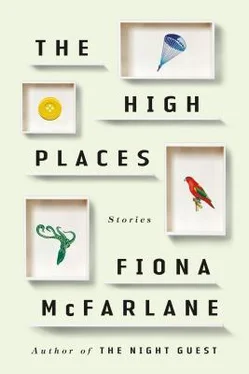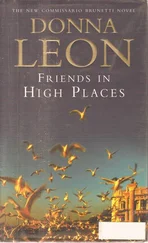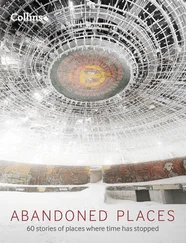This was the hour of his humiliation. He left the church at once. He drove with his yellow car pointed toward the sea, because this was the pattern of his annual holiday and he was unsure where else to go. A long flat plain and a range of mountains separated the Reverend from the sea. His bird rode above the steering wheel, on his right hand, as they crossed the plain and climbed the mountains, and as they descended, the clouds broke open and admitted a column of sun. Reverend Adams was moved to lower the window of his car and thrust his bird-heavy arm into the void, so that his parrot was obliged to take flight. He withdrew his arm and sealed himself in. And the white bird flew in the shaft of light above the car, above the revolving earth, until finally, man and bird together reached the sea.
James is being a sea lily.
‘Look, Dad,’ he says, ‘I’m being a sea lily.’
Unhurried, and with a submarine expression, he waves his small arms backward and forward and drifts around the room.
‘What would you call this kind of movement?’ he asks, waving and drifting.
‘I don’t know,’ I say. ‘How about “undulating”?’
He takes this on board. ‘I’m a sea lily undulating above the ocean floor. I look like a plant, but actually I’m an animal.’
‘You look like an animal to me,’ I say.
‘And when I die, I’ll turn into limestone.’
He’s on the couch now, on tiptoes, and the way his arms wave into the room it’s truly as if they’re long green stalks. Somehow I have produced a child who is capable of pulsing with a creepy aquatic languor.
‘I didn’t know small boys turned into limestone.’
‘I may look like a plant, but actually I’m an ANIMAL. I swim around the ocean with my ROOTS.’
James launches himself from the couch. He spends a fraction of an airborne second transfixed by the compact floating disguised life of the sea lily before landing among the carpet fluff — one arm over his face, one foot through the plywood of the china cabinet door. For this he is sent out to find his older brother. He knows he will be able to find Greg at the Wolfsons’, the Barters’, or possibly at the Carrs’, although Blake Carr has fallen from neighbourhood grace owing to the recent demise of his trampoline.
‘God,’ says Glenda, coming in damp from the kitchen as usual (the kitchen always unaccountably damp, and Glenda always arriving thirty seconds after an accident). ‘Your mother will love this. She hates that cabinet.’
Glenda’s bringing me a gin and tonic. Alcohol plays no part in this story; it’s just that taking the glass from her requires me to lean forward in my chair, and this means I see James out on the street on his one true possession, a bicycle with silver pedals, heading in the direction of the Wolfsons’. This is the last moment I can account for him with any authority for some time, and what I want to do now is re-create those hours after James left the house, a sea lily disguised as a small boy. I want to know what those hours were like for him. It’s not easy. There’s the police report, the security tapes, and Tony’s brother’s statement. These things help. But the difficulty lies in the task of remembering childhood, that busy time of waiting.
Glenda’s back is to the window. She doesn’t see him.
* * *
Glenda gave birth to Greg and then James with the flustered enthusiasm with which she approaches most activities. For some time afterward it was very easy to keep track of their movements. My parents supplied us with state-of-the-art devices intended to attach children to other things: strapped across our chests, immobile in the back seat of the car, bouncing in small buggies that fastened to Glenda’s bicycle. Initially, we functioned as tour guides to their lives, arranging for them to be moved from place to place. It didn’t last. First Greg, then James, acquired additional life. Their tiny bodies seemed designed for the express purpose of running quickly and cannily through department stores. Glenda showed the strain, so my mother took her to a day spa to be smothered in cool creams that smelled of supermarkets.
‘Philip,’ my mother said when they returned from the spa, ‘I’m worried about Glenda. I hope you’re looking after her. She seems subdued.’
Glenda, uncharacteristically immobile with aromatherapy, lay across the couch waiting for my mother to leave as the boys stacked brightly coloured plastic blocks around her feet.
It’s not that Glenda doesn’t get on with my parents. It would be difficult not to get on with them. They’re tanned, wear crease-free clothing, and play sociable tennis. They love Glenda and the boys with the kind of generosity that means they’ll come by for an impromptu visit and, if we’re out, wait in their car until we get home. Glenda will sigh as we pull into the driveway — a small sigh that I can hear but the boys can’t.
‘We were just passing,’ my mother will call, extracting herself from the hot car with the plucky expression of a dehydrated dog. My father’s arms will be full of bread rolls and newspaper cuttings and a book Glenda mentioned she liked the sound of a week ago. Our house feels smaller when they’re in it, more untidy.
My mother has expressed her concern at our practice of allowing the boys out to play unsupervised in the neighbourhood. She once discussed it with me in the garden, where only the magpies and I could hear her.
‘It was fine when you were young,’ she said, with her thin, tanned voice. ‘But things aren’t the same these days.’
‘They never go more than three blocks away,’ I told her. ‘And we have Neighbourhood Watch.’
‘You know I don’t often comment on your parenting,’ she said, looking around the garden, from fence to fence, window to window, as if scouting for disguised dangers about which I know nothing.
The boys’ social life may be confined to two or three streets but it’s still complex, fluid, and frequently involves Glenda and me in unexpected situations. James, then, on this hot afternoon, experiencing the injustice of being barred from home, the humid repetitive earthbound feeling of not occupying the ocean floor: James goes in search of his brother on his silver-pedalled bicycle. As soon as he received this bicycle from his grandparents — for no reason, I might add, it just arrived one day — James customised it with stickers of half-men, half-monsters. Glenda’s reaction to the stickers was: ‘Your grandfather gave you that bike and he isn’t going to like these.’ I couldn’t tell you the exact moment Glenda began living as if my parents were watching her every move through secret cameras embedded in unnecessary gifts.
‘This one is especially gruesome,’ I said, inspecting a particular sticker. It featured something green which appeared muscular despite its delicate tentacles.
‘I know,’ said James, conspiratorial. ‘He doesn’t eat. He photosynthesises.’
This is the bike James rides away on, basically homeless. That’s how his head seems — small and homeless. I look at the china cabinet, then at Glenda.
‘You can take the boys to the hardware store tomorrow,’ she says. ‘They love it there.’
That’s true. Even Greg never fails to be impressed by the number of small shiny things in the world.
* * *
This is what I think happened. James found his brother one street away at the Wolfsons’, and Greg was unhappy to see him. The accumulating sorrow — evicted from home and now unwelcomed by a brother. I know the Wolfsons’ yard well because I’ve negotiated it when tipsy. It’s all paving, swimming pool, and plants in pots. Bev Wolfson holds parties lit by candles and the moist glow of this obstacle-course greenery. Glenda and I wonder if their plants are fake because we’re jealous of their swimming pool, despite the temporary feel of its above-ground installation.
Читать дальше












